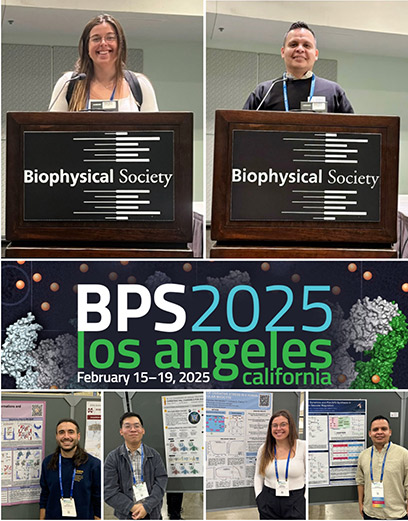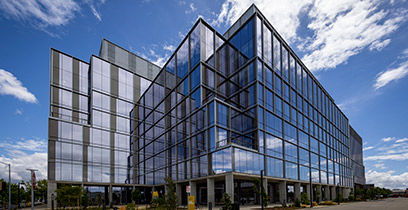Training the Next Generation
Khoa Ngo Awarded NHLBI-Funded T32 Postdoctoral Fellowship to Advance Cardiac Precision Medicine
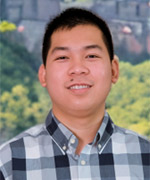

January 2026 — Khoa Ngo, Ph.D., a Postdoctoral Fellow in the Center for Precision Medicine and Data Science at UC Davis, received the T32 Basic and Translational Cardiovascular Medicine Postdoctoral Fellowship, supported by the National Heart, Lung, and Blood Institute (NHLBI). Ngo’s research uses machine learning and computer-based modeling to help translate genetic test results into clearer guidance for cardiovascular care. By combining evidence from population genetics, clinical reports, experimental studies, and protein and drug interaction models, he is developing approaches that can predict how specific DNA changes may alter proteins in the heart and influence medication response. This work aims to provide clearer, evidence-linked insights that can help reduce uncertainty in genetic interpretation and support safer, more personalized treatment decisions.
Design of ion channel modulators using artificial intelligence
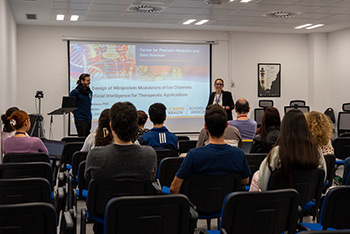
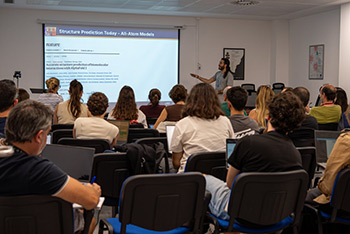
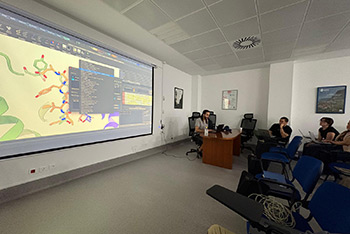
Diego Lopez Mateos, Ph.D., postdoctoral fellow in the Center for Precision Medicine and Data Sciences at UC Davis, participated this November in a visit to the Instituto de Tecnologías Biomédicas (ITB) of the University of La Laguna (Tenerife, Spain). As part of the visit, he delivered the seminar “Design of ion channel modulators using artificial intelligence” and led a three-hour hands-on workshop, “Modelado, análisis y diseño de estructura de proteínas con Inteligencia Artificial” (“Modeling, analysis, and design of protein structures with AI”), which brought together more than 35 students and researchers.
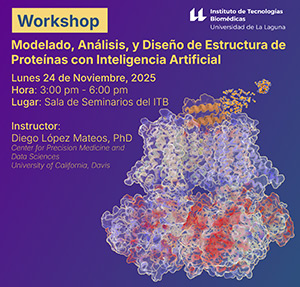
Through live demonstrations with tools such as AlphaFold and ChimeraX, participants explored how deep learning can accelerate protein structure prediction and the de novo design of protein binders with therapeutic potential, paving the way for next-generation therapeutics built entirely in silico. This outreach effort reflects CPMDS’s commitment to global scientific engagement, sharing cutting-edge methods across diverse scientific communities, fostering new collaborations, and helping train the next generation of scientists at the interface of structural biology, computation, and precision medicine.
Early Career Investigator Spotlight: Diego Lopez Mateos, Ph.D.
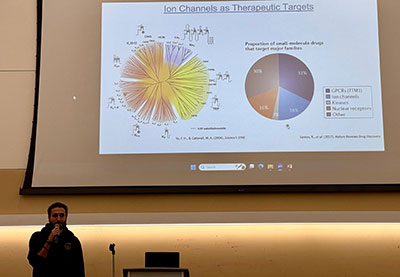 Postdoctoral Fellow in the Center for Precision Medicine UC Davis
Postdoctoral Fellow in the Center for Precision Medicine UC Davis
UC Davis Heart Research Day 2025
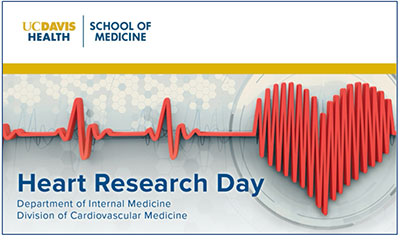
Diego Lopez Mateos presented his innovative research on the de novo design of ion channel pore-blocking miniproteins for atrial fibrillation, leveraging artificial intelligence to accelerate therapeutic discovery. His work demonstrates how computational design and molecular modeling can identify and optimize next-generation peptide inhibitors aimed at restoring healthy cardiac rhythms.
This project exemplifies the integration of AI-driven molecular engineering and cardiovascular physiology, providing a model for how early career investigators are advancing precision medicine through data-enabled discovery and translational innovation.
Capstone Publication – UC Davis Health Summer Internship Program in Precision Medicine and Data Sciences

Learners in the UC Davis Health Summer Internship Program in Precision Medicine and Data Sciences have published their capstone work, “Precision medicine requires integrated science education.” This piece highlights how the future of biomedical discovery depends on breaking down silos between disciplines: Linking genetics, physiology, computational modeling, artificial intelligence, and systems biology into a seamless, predictive science.
Drawing from their immersive summer experience, students describe how integrated, hands-on training reshaped their understanding of biology, computation, and medicine. From coding simulations of cardiac action potentials to using AlphaFold for protein structure prediction and designing cancer-targeting drugs, they experienced firsthand how convergence of disciplines fuels discovery. Reflections emphasize how precision education that is adaptive, active, and student-centered mirrors the principles of precision medicine itself by tailoring learning to individual needs while promoting collaboration and resilience.
This publication underscores a central insight: preparing the next generation of scientists requires more than teaching content. It requires cultivating intellectual agility, creativity, and confidence in moving fluidly across experimental and computational domains. By integrating disciplines early in training, learners begin to see themselves not just as students, but as contributors to the future of science and medicine.
UC Davis Health Summer Internship Program in Precision Medicine and Data Sciences
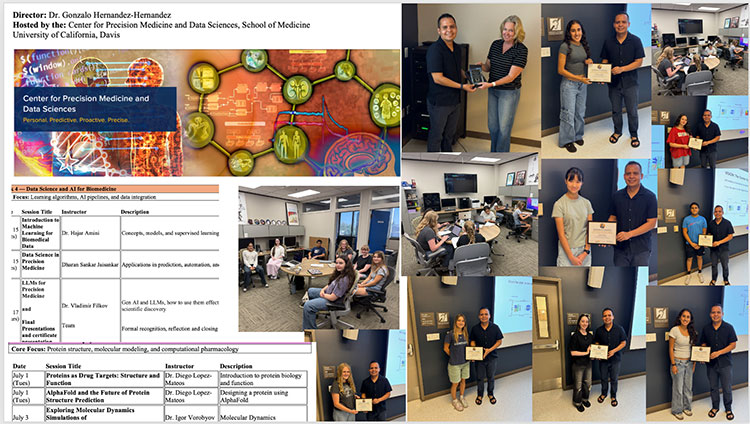
This summer, The Center for Precision Medicine and Data Sciences hosted an immersive, four-week internship program designed to introduce high school and undergraduate students to cutting-edge topics at the intersection of biology, medicine, and computation.
Participants explored a rich and interdisciplinary curriculum spanning molecular modeling, pharmacology, multiscale physiology, data science, and artificial intelligence. Through hands-on coding exercises, guided workshops, and project-based learning, students gained practical skills in molecular dynamics, computational logic, and data-driven analysis.
The program provided a unique opportunity for students to engage deeply with real-world biomedical challenges and develop foundational tools for future careers in precision medicine and data science.
Congratulations to this year’s participants—you were amazing!
CPMDS Trainees Highlighted in Scientific Talks and Poster Presentations at the Biophysical Society 69th Annual Meeting in Los Angeles
Los Angeles, California — CPMDS trainees presented their latest research updates at the Biophysical Society Meeting, held from February 15-19, 2025 in Los Angeles.
CPMDS trainees Hannah Zukowski (Ph.D. Candidate) and Gonzalo Hernandez-Hernandez (Post-Doctoral Fellow) were invited to give scientific talks titled “A Computational Model of Oxidative Stress in a Human Ventricular Myocyte” and “A Computational Model of Angiotensin II Receptor Type 1 Dynamics: Insights into Vascular Regulation”. Additionally, Diego Lopez Mateos (Post-Doctoral Fellow), Khoa Ngo (Post-Doctoral Fellow), Hannah Zukowski, and Gonzalo Hernandez-Hernandez presented their work during poster sessions. Poster titles included:
- Exploring Voltage-Gated Sodium Channel Conformations and Interactions Using AlphaFold – Diego Lopez Mateos
- At the Crossroads of Disease Treatments: Targeting Nav Channels for Both Breast Cancer and Chronic Pain Therapy – Khoa Ngo
- A Computational Model of Oxidative Stress in a Human Ventricular Myocyte – Hannah Zukowski
- A Computational Model of Angiotensin II Receptor Type 1 Dynamics: Insights into Vascular Regulation – Gonzalo Hernandez-Hernandez
The Biophysical Society Annual Meeting brings together researchers across disciplines to share emerging techniques and present cutting-edge, unpublished work. The strong presence of CPMDS trainees highlights the program’s commitment to advancing biophysical research and supporting early-career scientists on a global stage.
Inspiring the Next Generation
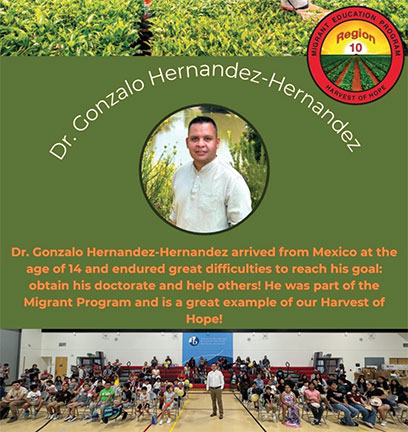
Gonzalo Hernandez-Hernandez, Ph.D.
On July 15, 2024, I had the honor of being a keynote speaker for the summer Migrant Education Program organized by the Antelope Valley School District. As a proud alumnus of Antelope Valley High School (class of '08) in Lancaster, California, where I participated in the English as a Second Language (ESL) program and benefited from the Migrant Education Program, this event held great personal significance for me. Returning to my high school after 16 years was a nostalgic and rewarding experience.
Addressing K-12 students and their parents, I shared my journey of arriving from Mexico at the age of 14 and overcoming obstacles to becoming a scientist. I recounted the challenges I faced, the perseverance required, and my achievements along the way, hoping to inspire them with my story. The enthusiasm and curiosity in the eyes of the students were truly heartwarming. Their eager faces reflected the same dreams and hopes I once had. I emphasized the importance of education and resilience, wanting them to see that their backgrounds and struggles could be the very foundation of their future success.
The event was a heartfelt and uplifting experience, leaving me inspired by the determination and aspirations of the young attendees. My keynote was more than just a speech; it was a celebration of potential, a call to action, and a reminder that they hold the power to shape their future. As a member of the Center for Precision Medicine and Data Sciences, I am committed to developing support programs to remind K-12 students of the boundless possibilities that lie ahead for them in science and medicine careers.
ARC-MD Program
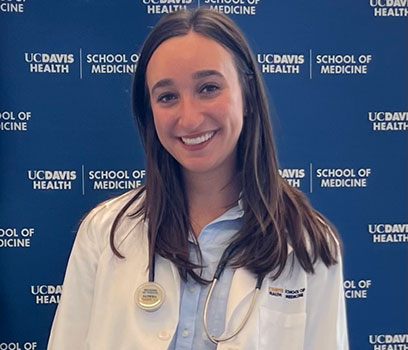
Chiara Anna Giordani
I am currently a second-year medical student in the ARC-MD program, and throughout my first year, I trained in the Clancy Lab to learn computational approaches to cardiovascular research. With the invaluable support of my research mentor, Colleen Clancy, Ph.D., my clinical mentor, Saul Schaefer, M.D., and the ARC-MD program directors, I was awarded a 2024 AHA Student Scholarship in Cardiovascular Disease. This funding allowed me to undertake an 8-week summer research selective in the Clancy Lab between my first and second years of medical school. During this time, I successfully executed a project aimed at predicting optimal therapy for atrial fibrillation, culminating in a poster presentation at the International Center for Mechanical Sciences in Udine, Italy. While there, I attended the course “Computational Modeling of the Heart: from Fundamentals to Clinical Applications,” which enhanced my training in computational modeling and provided me with valuable tools for my current research and future projects.
I am deeply grateful for the ARC-MD program’s partnership with the Center of Precision Medicine. As an aspiring physician-scientist, the opportunity to work alongside Ph.D. students, postdoctoral scholars, physicians, and project scientists in this space has been instrumental in my professional development.
Simula: SSCP 2024
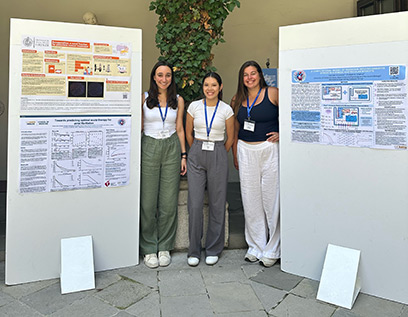
Hannah Zukowski
I recently participated in the Summer School in Computational Physiology (SSCP) 2024 at the Simula Research Laboratory in Oslo, Norway. The program provided an intensive two-week immersion into advanced computational methods and their applications in physiology. I had the opportunity to engage with leading researchers and fellow graduate students in a collaborative environment, enhancing my understanding of computational modeling and its implications in the biomedical field.
My project at Simula focuses on developing a fully coupled electromechanical simulator to assess doxorubicin-induced cardiotoxicity, aiming to predict arrhythmic risk and cardiac function alterations across different patient demographics. The study integrates existing cell electrophysiology and mechanics models into a tissue-level simulator, investigating the role of mechano-electric feedback in triggering cardiotoxic events.
CISM: Advanced Course in Computational Modeling of the Heart
During the second week in July, I attended the Advanced School on “Computational Modeling of the Heart: From Fundamentals to Clinical Applications” organized by CISM-Euromech in Udine, Italy. At this course, I studied state-of-the-art techniques in cardiac computational modeling, including multi-scale and multi-physics simulations, digital twins, and their clinical applications. During the course, I presented a poster on my work developing a computational model of radiation-induced oxidative stress in human ventricular myocyte (Informational Video), which facilitated valuable discussions and feedback from experts in the field.
Avenue M Program
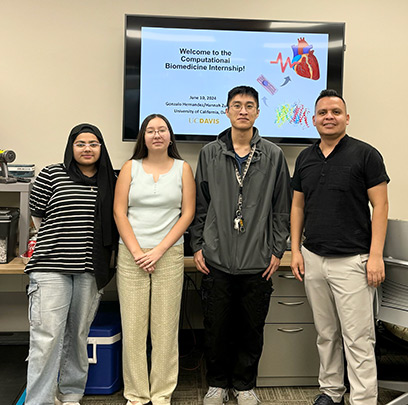
Avenue M is a community college-to-medical school pathway program housed at UC Davis School of Medicine, in partnership with CSU Sacramento, Cal Poly Humboldt, and a network of Northern California community colleges. Avenue M supports and mentors students from communities that have been historically excluded in medicine to become physicians.
Our summer program is designed to mentor and train students through engagement in cutting-edge research projects, overseen by faculty and researchers to ensure a comprehensive learning experience. Experienced mentors will guide interns, providing hands-on research opportunities and regular feedback. The program encourages interdisciplinary collaboration and includes training on ethical guidelines, patient confidentiality, and professional conduct. Interns will also have networking and career development opportunities, helping them build professional connections and prepare for future careers in healthcare.
Led by Gonzalo Hernandez-Hernandez, Ph.D., Avenue M students undergo a rigorous summer training program with curriculum that exposes students to broad areas of computational biomedicine from protein structure modeling to health informatics.
Teaching Precision Medicine
The Center for Precision Medicine and Data Sciences understands that for precision medicine to be successfully integrated into the medical mindset, we must teach and train the next generation of researchers and medical professionals. We regularly look for opportunities to provide mentorship and training for students and researchers in various disciplines that would benefit from a precision medicine approach.
Academic Research Careers for Medical Doctors (ARC-MD) Program
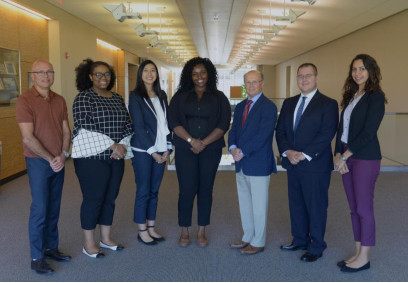 The inaugural cohort of the Academic Research Careers for Medical Doctors (ARC-MD) Program
The inaugural cohort of the Academic Research Careers for Medical Doctors (ARC-MD) Program
Frederick Meyers, M.D., M.A.C.P., serves as the Director of the Academic Research Careers for Medical Doctors (ARC-MD) program. The goal of the ARC-MD program is to provide medical students with the foundational skills and professional development that promote a successful career as a physician scientist. The five-year program provides students with research and career mentorship, special experiences, a unique curriculum, and community engagement within a supportive longitudinal learning community.
ARC-MD provides:
- A mentorship community of key teaching faculty who are also physician researchers
- Research and community service opportunities
- Professional development opportunities and advising
- Scholarship support, contingent upon student’s continued participation in program activities
- A stipend to undertake a research-intensive year in a UC Davis faculty laboratory between year 3 and 4
Learn more about research opportunities for medical students
Clinical and Translational Science Center (CTSC)
UC Davis hosts one of the inaugural Clinical and Translational Science Centers (CTSC) supported by the National Center for Advancing Translational Sciences (NCATS). Meyers currently serves as the director of the CTSC Research Education and Training Program and is a member of the CTSC Oversight and Governance Committee.
Learn more about the research education, training and career development program

